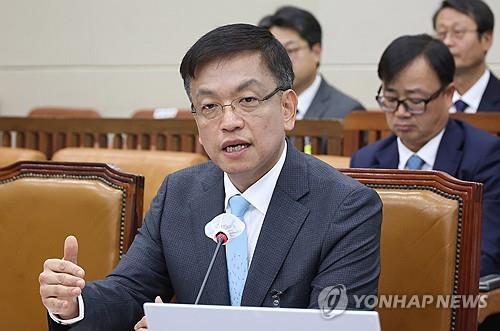SEOUL, Dec. 19 (Yonhap) — Finance Minister nominee Choi Sang-mok vowed efforts Tuesday to better manage real estate project financing (PF) risks and seek fundamental reform measures to minimize its potential impact on the overall economy.
Choi made the remarks during his parliamentary confirmation hearing, where he also stressed his policy priority of stabilizing the people’s livelihood by easing inflation, as well as enhancing South Korea’s economic growth potential through deregulation and advanced industries.
Choi, former senior presidential secretary for economic affairs, was named the minister of economy and finance who doubles as deputy prime minister for the economy earlier this month to replace Choo Kyung-ho.
“I will thoroughly manage potential risks in vulnerable sectors. As for the real estate PF, tailored supportive measures are needed for its soft landing, as well as measures to fundamentally reform the sector,” Choi said.
Delinquency rates of real estate PF loans have risen recently amid the sagging real estate market, sparking concerns over the financial health of highly exposed companies and the instability of the overall financial system.
Finance Minister nominee Choi Sang-mok speaks during his confirmation hearing at the National Assembly in Seoul on Dec. 19, 2023. (Yonhap)
To achieve longer-term growth, Choi called for efforts to “dramatically add dynamics to the economy.”
“I will boost the overall economic efficiency and prop up growth potential by pushing for deregulation and structural reform and nurturing science and technologies and advanced industries” Choi said.
The nominee also vowed to prioritize the stabilization of people’s livelihood by curbing inflation and extending support for vulnerable groups.
“Our economy has shown signs of a recovery on the back of growing exports, but many people have not felt warmth as prices and interest rates remain high and the pace of a recovery varies among sectors,” Choi said.
“Priority should be on easing inflation swiftly by extending fuel tax cuts and various types of support. I will also double efforts to boost domestic demand and investment, while extending support for vulnerable groups, smaller merchants and regional economies,” he added.
Exports have bottomed out to rise for the second consecutive month in November after a yearlong downturn. But the Bank of Korea earlier this month slashed next year’s growth outlook to 2.1 percent from 2.2 percent, citing weak domestic demand and external factors.
The country also has seen a gradual slowdown in inflation this year, but consumer prices stayed above 3 percent. The government said prices have been easing at a slower pace than expected as energy and fresh food prices remain high over geopolitical risks and unfavorable weather conditions.
[email protected]
(END)
Credit: Source link






























